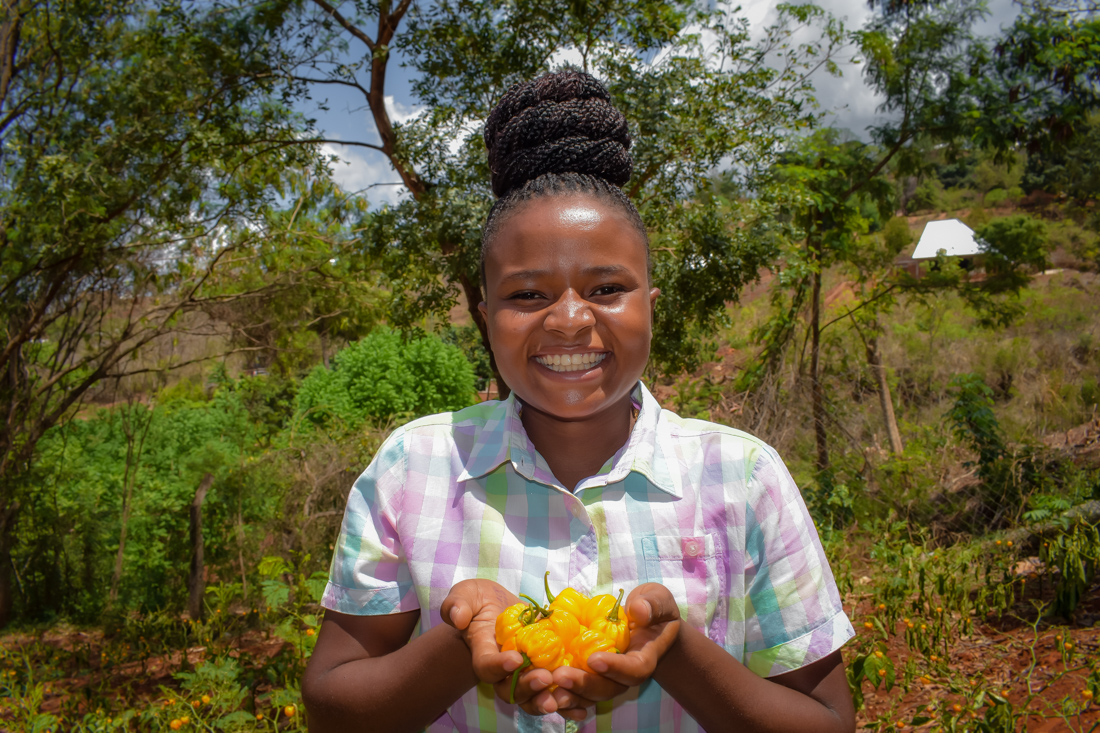Pride, confidence, and independence have taken root for this young agribusiness owner
Story

Jesca has seen so much growth lately – growth from her habanero chilis, as well as growth in her confidence, her business skills, and her outlook for a bright future of financial independence.
The 21-year-old agriculture student is building a thriving agribusiness, by harvesting and selling her chilis at several markets in Tanzania.
The youngest of five children, growing up in Kilimanjaro wasn’t easy. Her father passed away when she was young leaving her mother to care for the family. Struggling and lacking direction, she followed the advice of an older sister, who urged her to pursue opportunities that would enable her to get an education.
“She convinced me to gain knowledge in school so that I can improve myself,” says Jesca.
She found the perfect opportunity through the Cuso International-supported Kizimba Business Model (KBM) project that’s operating in Tanzania’s Morogoro region.
Facilitated by the Sokoine University Graduate Entrepreneurs Cooperative (SUGECO), the project promotes opportunities for self-employment in agriculture and agribusiness for women and youth like Jesca.
With assistance from local government, academic, and private sector partners, the KBM provides participants with specially created plots of land to farm crops with strong market demand, such as mango, soya beans, and chili peppers.
Cuso International volunteers assist program participants by supporting different disciplines including agribusiness management, finance, and agricultural engineering.
To date, more than 1,000 acres have been designated to the project and the KBM team has been evaluating the Habanero chili as a prototype in the Morogoro region with promising results for budding entrepreneurs like Jesca.
With the help of her sister and friends, Jesca cleared a designated plot of land and planted her first crop of Habanero seeds last April. And along the way, she has learned valuable skills in her classroom work through SUGECO related to crop management, soil conditions, irrigation and crop diseases.
“Now, I know I can manage a farm,” she says.
By becoming a business owner, Jesca can avoid some of the difficulties so many women in her area often face.
For example, despite their high numbers, women are often exploited and receive a poor share of profits from the sale of crops and have limited access to markets. They are also rarely given a chance to participate in the management of livestock or the ownership of land.
And yet, they are expected to take full care of their children and husbands — cooking, washing clothes, mending clothes, cleaning their homes and other household chores, and possibly running small businesses to contribute to the household income.
But this patriarchal control ultimately creates economic hardship from low-income generation, limited access to education and resources, and frequently leads to gender-based violence.
Determined to avoid these outcomes, Jesca now sees a different path for herself.
However, cultivating chilis is not without its difficulties – from irrigation issues, to soil deficiencies, to the threat of disease, to severe weather patterns brought on by climate change. Add to this, the intense physical labour involved as well as the demanding schedule of tending to her crops and managing her school work.
But Jesca is prepared to face and overcome all of these challenges, confident in her skillset.
As a result, she feels the satisfaction of ownership for the first time. “My life has changed so much because everything is mine,” she says, filled with pride at generating her own income.
And while she is poised for personal success, she hopes to share her newfound knowledge with her family as well as her home village, which still follow outdated farming methods.
“More and more, I want my family to move from traditional to more advanced practices,” she says, adding she’s also eager to pass along her knowledge and skills to her local community.
Jesca’s dream is to own a plot of land and manage her own farm, growing chilis and other crops in the Morogoro region. “I’m going to use all my all skills and all of my knowledge to do that,” she declares.
In the meantime, she’s encouraging other young women to become involved with SUGECO and Cuso International so they too can learn the skills to be independent business owners.
“I tell them there is so much they can learn, and the people there are so kind,” she says. “They teach you in a way that’s practical and that you can understand.”